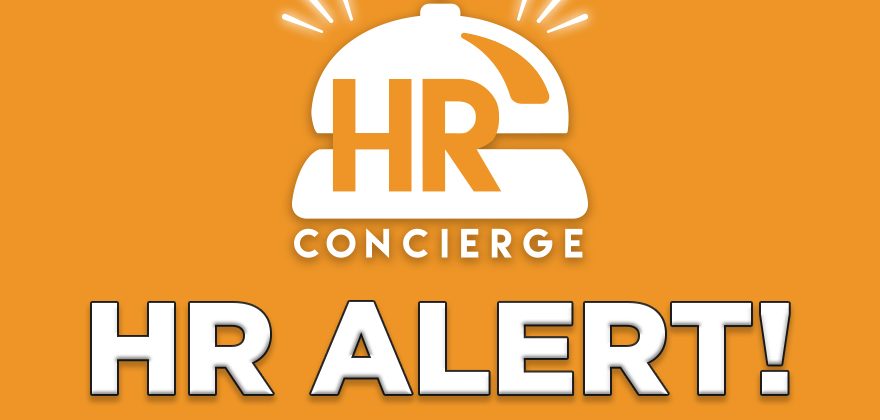HR Alert – Psychosocial Hazards in the Workplace
By Howardco on Jun 22, 2023 in HR Alert |
From April 1st, 2023, the Workplace Health and Safety (WHS) laws in Australia, specifically the Commonwealth Code of practice: managing psychosocial hazards in the workplace have been updated. This will impact how businesses managing, report and prevent psychosocial hazards in the workplace.
But what exactly are psychosocial hazards? According to Comcare (https://www.comcare.gov.au/safe-healthy-work/prevent-harm/psychosocial-hazards), they are aspects of work that have the potential to cause psychological or physical harm.
Examples of common psychosocial hazards, as identified by Safe Work Australia, include:
- excessive job demands
- low job control
- poor support
- lack of role clarity
- inadequate reward and recognition
- poor organizational change management
- traumatic events or material
- remote or isolated work
- poor physical environment
- violence or aggression
- bullying, harassment (including sexual harassment)
- and conflict or poor workplace relationships and interactions.
While a single psychosocial hazard may not present a risk on its own, it is important to note that such hazards rarely occur in isolation.
Identifying the psychosocial risks in your workplace and addressing it proactively are not only a legal obligation but can:
- Increase employee productivity. A ComPsych survey found that 37% of employees stated that they lost an hour of productivity a day due to work relates stress.
- Decrease absenteeism. Research by Beyond blue indicates that 1 out of every 5 employees in Australia has taken time off work in the last 12 months due to stress, anxiety, depression etc.
- Improve the physical well-being of the employee.
- Boost employee engagement.
- Reduce turnover. A study by Forbes indicated that 46% of HR leaders believe up to half of their annual turnover can be attributed to burnout.
All businesses operating in Australia and covered by the WHS Act have a legal obligation to manage the risks of psychosocial hazards in the workplace, including those caused by third parties such as clients, visitors, and customers.
These new regulations apply to all businesses and include:
- Employers
- Employees
- Contractors
- sub-contractor
- self-employed individuals
- apprentices and trainees
- work experience students
- volunteers
- and anyone else in the workplace such as customers or visitors.
Failure to comply with these regulations may result in prosecution and fines (https://www.worksafe.qld.gov.au/laws-and-compliance/compliance-and-enforcement/penalties) , depending on the nature and seriousness of the offense.
To meet this new obligation, businesses are expected to eliminate or minimize psychosocial risks as much as possible. This can be achieved by following a risk management process that includes:
- identifying hazards
- assessing risks
- controlling risks
- and reviewing control measures to ensure they remain effective.
Overall, it is crucial for businesses to understand the new regulations and take proactive steps to manage psychosocial hazards in the workplace. By doing so, they can create a safe and healthy work environment for their employees and reduce the risk of harm.
Code of practice Managing Psychosocial Hazards – https://www.safeworkaustralia.gov.au/doc/model-code-practice-managing-psychosocial-hazards-work
kampungbet
bandar togel
situs toto
jacktoto
jacktoto
jacktoto
jacktoto
slot online
toto togel
toto slot
jacktoto
cabe4d
situs toto
cabe4d
slot gacor
toto slot
situs toto
jacktoto
toto slot
situs toto
jacktoto
slot gacor
jacktoto
toto slot
jacktoto
jacktoto
situs toto
toto slot
jacktoto
jacktoto
jacktoto
jacktoto
jacktoto
jacktoto
link jacktoto
jacktoto
jacktoto
toto slot
jacktoto
jacktoto
jacktoto
jacktoto
jacktoto
jacktoto
jacktoto
jacktoto
jacktoto
rtp slot
jacktoto
jacktoto
jacktoto
situs toto
slot online
jacktoto
toto slot
slot resmi
jacktoto
situs toto
toto slot
jacktoto
jacktoto
situs toto
toto slot
jacktoto
jacktoto
jacktoto
jacktoto
jacktoto
jacktoto
jacktoto
jacktoto
toto slot
jacktoto
jacktoto
jacktoto
jacktoto
slot gacor
jacktoto
jacktoto
jacktoto
jacktoto
situs slot
jacktoto
toto slot
jacktoto
jacktoto
jacktoto
situs togel
jacktoto
jacktoto
jacktoto
jacktoto
situs toto
jacktoto
link slot
jacktoto
jacktoto
situs toto
jacktoto
situs toto
jacktoto
toto togel
toto slot
situs toto
jacktoto
toto slot
jacktoto
jacktoto
jacktoto
jacktoto
jacktoto
jacktoto
jacktoto
jacktoto
situs toto
jacktoto
situs toto
toto slot
jacktoto
situs toto
jacktoto
situs toto
situs toto
jacktoto
jacktoto
jacktoto
slot gacor
jacktoto
jacktoto
link slot
jacktoto
jacktoto
jacktoto
jacktoto
jacktoto
situs togel
jacktoto
situs toto
jacktoto
jacktoto
jacktoto
jacktoto
toto slot
jacktoto
situs togel
situs toto
link slot
jacktoto
jacktoto
jacktoto
jacktoto
jacktoto
jacktoto
jacktoto
jacktoto
jacktoto
jacktoto
jacktoto
jacktoto
link slot
jacktoto
toto togel
slot gacor
jacktoto
jacktoto
jacktoto
situs toto
jacktoto
jacktoto
jacktoto
situs toto
situs slot
rtp slot
situs gacor
jacktoto
jacktoto
slot online
link gacor
toto togel
toto togel
situs slot
toto togel
jacktoto
jacktoto
jacktoto
jacktoto
toto slot
jacktoto
situs toto
toto togel
jacktoto
situs toto
jacktoto
toto togel
toto togel
slot online
jacktoto
slot gacor
situs toto
jacktoto
situs toto
toto togel
link slot
jacktoto
jacktoto
jacktoto
jacktoto
jacktoto
jacktoto
jacktoto
toto slot
jacktoto
situs toto
slot gacor
toto togel
jacktoto
situs toto
toto togel
toto togel
toto togel
jacktoto
situs toto
jacktoto
situs toto
toto slot
situs toto
situs toto
slot gacor
slot online
link slot gacor
jacktoto
jacktoto
slot online
situs toto
link slot
link slot
jacktoto
jacktoto
situs toto
jacktoto
link slot gacor
toto togel
jacktoto
jacktoto
jacktoto
toto togel
toto togel
toto togel
jacktoto
jacktoto
situs toto
toto togel
situs slot
situs toto
situs toto
toto togel
toto togel
toto togel
rtp slot
jacktoto
jacktoto
jacktoto
jacktoto
situs toto
link togel
jacktoto
toto togel
jacktoto
situs togel
toto togel
situs slot
situs toto
jacktoto
link slot
jacktoto
situs toto
toto togel
link togel
situs toto
jacktoto
situs slot
link slot
link slot
toto slot
jacktoto
toto slot
situs toto
jacktoto
link togel
togel resmi
situs slot
link togel
situs toto
situs slot
toto togel
jacktoto
toto togel
jacktoto
slot online
situs toto
toto togel
link togel
jacktoto
link togel
situs slot
link togel
situs slot gacor
situs togel
toto togel
jacktoto
toto slot
link togel
toto togel
slot online
link slot
link togel
link togel
link togel
toto togel
jacktoto
situs toto togel
situs toto togel
situs toto togel
link togel
link togel
slot gacor
jacktoto
toto togel
link togel
jacktoto
jacktoto
situs togel online
situs togel resmi
situs togel
situs togel resmi
link slot resmi
situs slot gacor
situs slot gacor
situs togel resmi
jacktoto
situs slot toto
link slot gacor
link toto togel
link slot gacor
jacktoto
situs toto togel
link slot gacor
jacktoto
link gacor
link slot online
slot gacor
situs toto slot
link slot gacor
situs toto
situs toto togel
jacktoto
link togel resmi
jacktoto
situs toto
link togel resmi
situs togel resmi
toto slot
situs togel resmi
situs toto
link slot resmi
situs slot
situs slot online
situs slot gacor
situs togel resmi
situs toto slot
link slot gacor
toto slot online
slot gacor hari ini
situs toto macau
link togel resmi
jacktoto
togel online
situs slot
link slot gacor
situs toto togel
jacktoto
jacktoto
situs toto togel
jacktoto
jacktoto
situs slot gacor
situs hk
link slot resmi
situs togel terpercaya
link togel
situs toto togel
jacktoto
situs slot gacor
jacktoto
situs toto
link slot
situs gacor
jacktoto
toto togel
situs togel
jacktoto
slot resmi
toto togel
toto togel
link togel
situs slot
situs togel resmi
toto slot
slot gacor
situs toto
link slot
situs toto
jacktoto
jacktoto
jacktoto
jacktoto
jacktoto
jacktoto
jacktoto
situs toto slot
situs toto slot
situs toto
jacktoto
situs togel resmi
jacktoto
jacktoto
link togel
link togel
slot online
slot online
togel
link togel
jacktoto
jacktoto
toto slot
toto slot
situs toto togel
jacktoto
situs toto togel
jacktoto
jacktoto
situs slot
situs slot
link slot online
link slot online
situs slot gacor
situs slot gacor
jacktoto
situs toto
jacktoto
link togel
situs toto slot
toto slot
situs togel resmi
jacktoto
situs toto slot
situs toto slot
link slot
jacktoto
jacktoto
jacktoto
toto togel resmi
situs toto
situs toto
jacktoto
situs toto togel
jacktoto
toto slot
situs toto togel
link togel terpercaya
situs toto togel
jacktoto
toto togel
situs togel
jacktoto
jacktoto
situs toto togel
situs toto togel
jacktoto
jacktoto
situs toto togel
situs toto togel
link togel resmi
toto togel
toto togel
link slot
jacktoto
toto slot
link togel
situs toto
bandar toto
bandar toto
situs toto togel
jacktoto
situs toto togel
situs toto
jacktoto
jacktoto
jacktoto
jacktoto
toto togel
link toto togel
jacktoto
toto togel
situs toto
situs slot online
togel
situs toto
jacktoto
jacktoto
situs toto togel
jacktoto
jacktoto
toto togel
situs toto
link slot gacor
situs slot resmi
situs toto togel
situs toto togel
jacktoto
jacktoto
situs slot
situs toto togel
situs toto togel
link togel online
toto togel
situs toto togel
jacktoto
toto togel
link togel online
situs toto togel
situs toto togel
situs toto slot
toto togel
link togel resmi
jacktoto
link slot maxwin
jacktoto
toto slot online
situs toto
toto togel
jacktoto
situs toto togel
situs slot resmi
jacktoto
link slot
jacktoto
jacktoto
situs toto
jacktoto
jacktoto
situs toto togel
situs slot resmi
situs togel online
toto togel
situs toto togel
situs slot resmi
link slot gacor
link slot gacor
situs slot
link togel resmi
jacktoto
jacktoto
situs toto togel
situs toto togel
link slot
situs toto togel
situs slot online
toto togel
toto togel
link slot resmi
link slot online
situs toto togel
jacktoto
jacktoto
jacktoto
jacktoto
link togel resmi
slot resmi


















